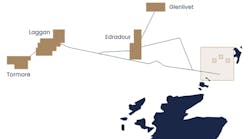Consortium applies for funding for North Sea Nini West CO2 storage pilot
Offshore staff
COPENHAGEN, Denmark – INEOS Energy, Wintershall Dea, and a consortium of 29 companies, research institutes and universities have committed to support the next phase of the Greensand pilot project, targeting safe and permanent storage of CO2 in the Nini West reservoir in the Danish North Sea.
The Greensand consortium, which includes 29 companies, research institutes and universities, will file a grant application with Denmark’s Energy Technology Development and Demonstration Program in Denmark.
Welltec’s CEO Peter Hansen sees great potential in the development of wells that can handle the complicated process of storing captured CO2.
If approved, work on the project could start by the end of 2021, with the offshore injection pilot staged in late 2022.
Last December the Danish Parliament agreed to set aside a funding pool to support a Danish CO2 storage pilot project, investigating the reservoir-CO2 interaction in the Danish North Sea. This pilot could form the basis for a decision to allow full-scale CO2 storage at Nini West to begin by 2025.
According to Wintershall Dea, the findings could lead to safe subsurface storage of up to 8 MM metric tons/yr (8.81 MM tons) of CO2, equivalent to one-quarter of all Denmark’s emissions.
Under proposals for the pilot scheme, emissions will be captured at the Aalborg Portland cement production complex in northern Jutland and transported to the Nini West reservoir by ship.
Nini West is in the Siri Area, thought to hold storage potential of 0.5-1 MM metric tons/yr (0.55-1.1 MM tons) of CO2 by 2025, increasing to 4-8 MM metric tons/yr (4.4-8.8 MM tons) by 2030.
The Paleocene sandstone fields of this area are located at what is thought to be an optimal depth of 1.5-2.2 km (1-1.4 mi), and encased in one of the most competent cap rocks in the North Sea.
The area is also geologically stable and has retained gas and oil for 10-20 million years.
In the first (appraisal) phase of the Greensand project, studies showed that there were no barriers to the development of a CO2 storage site, resulting in independent certification from DNV that the Nini West field is conceptually suitable for injecting 0.45 MM t/yr of CO2 per well over a 10-year period, and that the subsea reservoir can safely contain the CO2.
Pilot phase 2 (proof of concept) planning is now under way, with FID planned for the second half of 2023, with around 24 months thereafter to prepare for carbon storage to become operational from around 2025.
Testing of the well materials will take place at downhole tools specialist Welltec’s test center in Esbjerg, which includes a new full-scale CO2 test loop.
Hansen said his company was already participating in CO2 projects and high temperature geothermal applications.
08/17/2021



